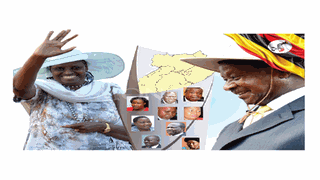
President Museveni's cabinet is dominated by ministers who majored in Arts related academic disciplines. PHOTO/COMBO
|National
Prime
Where are scientists in Museveni’s Cabinet?
What you need to know:
- The Uganda National Council for Science and Technology Act, 1990, defines the “fields of science and technology” to include “social sciences and humanities”, raising questions as to whether the Executive in its renewed science promotion push is alive to the guiding legislation.
- Our analysis of the educational qualifications of the 81 ministers shows that only 20 out of 81 studied sciences. At least 15 are teachers by profession.
Almost eight in every 10 members of Cabinet studied humanities or equivalents, opening them up for tighter scrutiny as the government in which they superintend executive decisions pushes an aggressive agenda to promote sciences to propel the country forward.
The policy shift, in place a decade ago, has lately been accelerated after industrial actions by doctors and nurses, and later teachers of science subjects, resulted in the government significantly enhancing their salaries in the new fiscal year that started last Friday.
For instance, Science teachers will get an average Shs4m monthly pay compared to the about Shs800,000 take-home for their Arts counterparts.
The pay disparity prompted a strike by teachers of Arts subjects at government schools, paralysing learning across the country for three weeks, before they walked out empty-handed and abandoned the industrial action following their second terse meeting with President Museveni.
Like he, alongside Education minister Janet Kataha and her Public Service ministry counterpart Muruli Mukasa, have previously argued, Mr Museveni yesterday told striking teachers to return to class as negotiation on their pay raise in the future continues because the government at present has limited resources and can only afford to improve remuneration for scientists.
There is nothing to suggest a fault with the government prioritising science and technology to spur Uganda’s development, but many including the leadership of Uganda National Teachers Union (Unatu) have questioned the motive and timing as well as the polarising effect of wide intra-Education sector pay disparity on teaching and learning, and Arts-science teacher relations at schools.
Some experts ask whether higher pay alone is sufficient driver of the science promotion agenda in a country where majority rural public schools have no or few laboratories, no chemicals and reagents for practicals and no electricity.
More striking is the fluidity, and in some ways contradiction, in the definition or science and a scientist. In public discourse, the President and some of his ministers vocal on the matter have argued that scientists include teachers of science subjects at secondary and post-secondary institutions as well as individuals who studied medical and physical sciences or Information, Communication and Technology.
However, our examination of the Uganda National Council for Science and Technology Act, enacted in 1990, defines the “fields of science and technology” to include “social sciences and humanities” in addition to engineering and technology, computer science, electronics and informatics, human and veterinary medicine and bio- and geo-sciences.
The functions of the Council as specified under Section 4, among others, include advising on and coordinating the formulation of an explicit national policy on all fields of science and technology and to assisting in the promotion and development of indigenous science.
It remained unclear if Cabinet was alive to the contradiction in its renewed policy and the Act, or whether it benefited from the expertise of the Council in its science promotion push.
In addition, the government has sent home dozens of scientists recruited from its entities as frontliners under the Science, Technology and Innovation ministry after the ministry’s budget was last year moved, amid protests by the employees and Parliament, under State House while the actual ministry is now domiciled under the Presidency.
Asked yesterday if now is the time to reconstitute Cabinet and onboard more scientists to fast-track Uganda’s aspiration of socio-economic transformation, Government spokesman and ICT minister Chris Baryomunsi, himself a medical officer, said: “We are promoting science for social and economic transformation. Scientists use their knowledge to innovate, discover and transform. Cabinet does not go to the laboratory. We manage the country and the decision we make is not in the laboratory; so, the two are not related.”
The Cabinet, in Uganda’s case, comprises the President, Vice President and full ministers and state ministers, who currently number slightly more than 80.
Their core functions under Article 111(2) of the Constitution are to “determine, formulate and implement the policy of the government”.
Salary disparities:Are we ready for consequences?
As our analysis shows, nearly 80 percent of them never studied sciences themselves, yet they are among the most politically powerful and resourced public officials. Members of the Executive top brass have educational roots in humanities, our findings show.
For example, President Museveni and his wife Janet, the Education minister who is responsible for directing the quality of Uganda’s human resource training, as well as Vice President Jessica Alupo and Prime Minister Robinah Nabbanja between themselves studied political science, democracy and development studies, international relations and Education.
Such Arts courses, President Museveni has argued in the past, add little value to progress Uganda which, in his words, is the reason his current government’s priority is promoting sciences.
Our analysis of the educational qualifications of the 81 ministers shows that only 20 out of 81 studied sciences. At least 15 are teachers by profession.
As debate about the science-Arts divide, and accompanying pay disparity, gains traction in public discourse, some academics have weighed in to call for a holistic approach as science and humanities complement each other.
Among the scholars is Prof Celestino Obua, the vice chancellor of Mbarara University of Science and Technology, who urges the government to prioritise Arts and Sciences because both are “important”.




